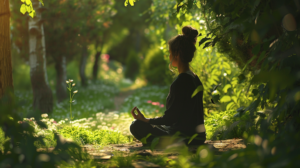Spirituality
Path to enlightenment
Spirituality has many definitions. I cannot give you one, defined answer, what is it.
- Traditional meaning states that spirituality is a process of re-formation, aiming to restore the original nature of a person as the image of God. This transformation is guided by a specific model, such as the Torah in Judaism, Christ in Christianity, Buddha in Buddhism, and Muhammad in Islam.
- Modern spirituality emphasizes personal experience, individual growth, and the search for deeper meaning in life. It often exists outside organized religion and includes elements of humanistic psychology, mystical traditions, and Eastern philosophies.
Which one is true? I have no idea. But I can guide you through different views, opinions and practices. They will help you shape a view on spirituality, and forge own path.
I hope you will find your truth.

The Power of Silence: Why Spiritual Growth Requires Stillness

How to Strengthen Your Intuition Through Spiritual Practice

What Is Ego Death? The Spiritual Meaning Behind It

Minimalism and Spirituality: The Path to Inner Peace

Spiritual Awakening Signs: How to Recognize Your Inner Growth

Understanding Energy and Vibrations in Spirituality
What is Spirituality?
Spirituality is a deeply personal concept, making it difficult to define with a single, absolute meaning.
Traditionally, spirituality has been seen as a process of transformation—one that seeks to restore a person’s original nature in alignment with the divine. This perspective is often guided by religious teachings, with figures like Christ in Christianity, Buddha in Buddhism, Muhammad in Islam, and the Torah in Judaism serving as spiritual models. In this view, spirituality is a structured path toward enlightenment, self-purification, or connection with a higher power like God.
Modern spirituality, however, shifts the focus toward personal experience and inner exploration. It often exists outside of organized religion, emphasizing individual growth, self-awareness, and the search for deeper meaning in life. This perspective draws from various sources, including humanistic psychology, mystical traditions, and Eastern philosophies.
Meditation, mindfulness, and self-reflection become key tools for those who approach spirituality as a personal journey rather than a set doctrine. It is less about adhering to external beliefs and more about discovering one’s own truth through direct experience.
So, which definition of spirituality is true? There is no single answer. Spirituality is as diverse as the people who seek it, shaped by culture, beliefs, and personal experiences. The key is to explore different viewpoints, reflect on what resonates with you, and forge your own path. Whether through religious faith, mindfulness practices, or a personal philosophy, your spiritual journey is yours to define.
